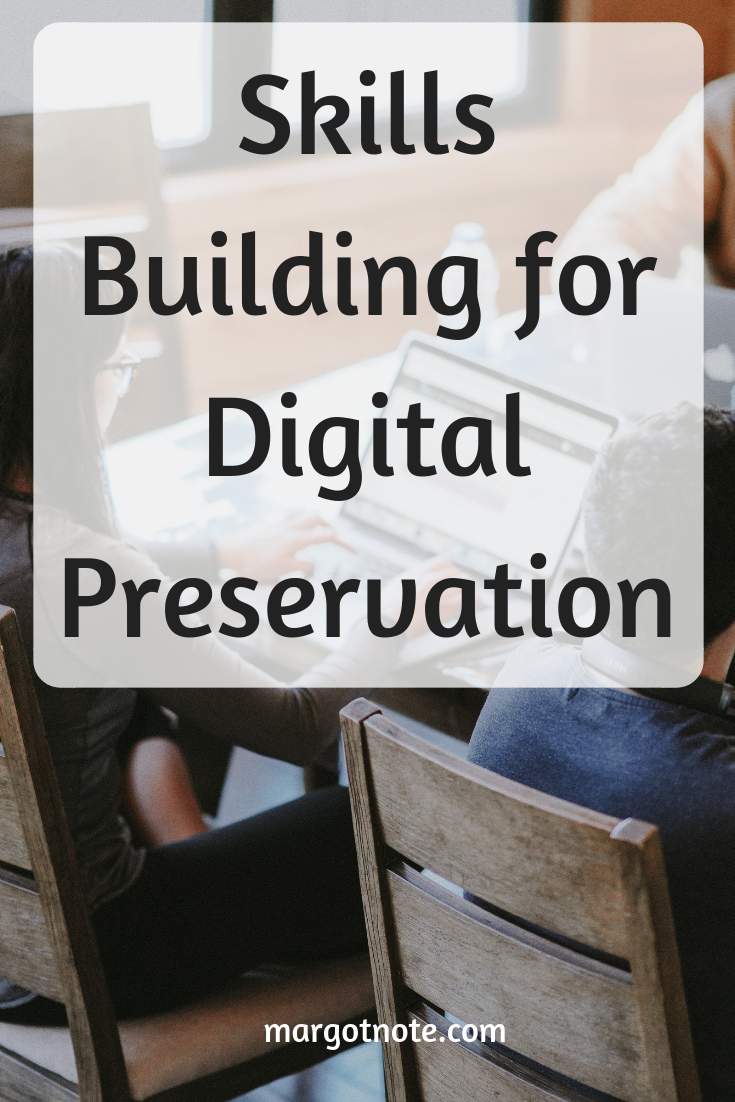The archival field lacks people with the expertise needed to extend the digital preservation agenda. Formal training opportunities for digital preservation are still rare, so much is learned on the job. New archivists may be uncertain as to where to acquire specific skills, and seasoned archivists need to broaden their knowledge or expand their roles professionally.
Training to meet these needs most often occurs outside of institutional educational settings, relying on the learner’s ability to locate free or low-cost resources. Efforts to understand and meet training and skills needs for the preservation, management, and handling of data are burgeoning, with significant work underway.
Needs Assessment for Technical Skills
Training needs surveys have attempted to gather information to pinpoint current and anticipated skills needed for digital preservation. For example, the Digital Archiving and Preservation Training Needs Survey was developed in collaboration with the Digital Curation Centre (DCC), Digital Preservation Coalition (DPC) and University of London Computer Centre (ULCC). The three organizations have worked collaboratively with the aim of promoting best practices and providing training on the long-term preservation and sustainability of digital content.
Increasingly, there has been investigation about the skills required, including the DigCCurr (Digital Curation Curriculum) project, which produced a detailed listing of the skills and competencies needed. The SHERPA Project (Securing a Hybrid Environment for Research Preservation and Access) identified nine skill categories: management; software; metadata; storage and preservation; content; advocacy, training, and support; internal liaison; external liaison, and current awareness and professional development. DigCurV created a curriculum framework for digital curation that can be used to develop new training resources and to identify skill gaps. The project examined three levels (practitioner, manager, and executive) and indicated digital curation skills and competencies and pathways of skills progression.
Training Opportunities
Webinars, workshops, summer schools, and other educational opportunities dedicated to digital preservation are on the rise. For example, Digital Preservation Management: Implementing Short-Term Strategies for Long-Term Solutions is an online tutorial that examines many concepts and elements of digital preservation.
Training assists archivists to keep current in a constantly changing landscape. Digital preservation work requires that practitioners stay up-to-date with formats, software, and standards. Materials on digital preservation help learners familiarize themselves with topics, gain confidence, and develop the skills they need to start working with digital collections. These materials support common practices and vocabularies that strengthen the digital preservation community; they provide continuity within a constantly shifting environment.
Formal educational programs dedicated to managing digital material are increasing as well. Resident programs—such as the National Digital Stewardship Residences in the United States—allow practitioners to develop and advance digital stewardship skills in real-world settings.
Some of the larger digital preservation research projects have included educational elements. The International Research on Permanent Authentic Records in Electronic Systems (InterPARES) 3 Project, for example, developed teaching modules for use in training programs, continuing education workshops, and curricula. The goal of the training is to provide professionals with the competency to preserve digital heritage and protect its accuracy and authenticity. The PERICLES project (Promoting and Enhancing Reuse of Information throughout the Content Lifecycle taking account of Evolving Semantics), funded by the European Union, produced a series of online, self-instructive, stand-alone modules.
Influencing Data Creation
Increasingly, it will also be necessary to educate the creators of digital materials about preservation so that they apply appropriate standards at the beginning of their projects. Creating digital assets with preservation in mind will be helpful in making lasting materials that require less intervention. The need to educate creators about issues and techniques to address them is ongoing.
General Professional Skills
General skills are needed at a high level to provide a deep understanding of the reasons why preservation is required. High-level capabilities, such as project management, presentation skills and advocacy are needed, as well as technical skills. For example, the Digital Archiving Preservation Training Needs Survey highlighted interest in planning skills, such as organizational change and advocacy, collaboration, and strategic thinking. While training resources exist in these areas, the field of digital preservation has unique possibilities and challenges that require additional professional context. Training that supports strategic planning and digital preservation can fulfill this need.
Skillsets for Success
Despite the progress in recent years, the challenge of meeting the need for education and training in digital preservation is still high and will take many years to address comprehensively. Archivists and other information professionals continue to look for digital preservation training and professional development opportunities that enable them to perform their jobs confidently—with the right information and skills to make decisions that affect digital heritage in the long term.
As the field defines and codifies techniques for digital preservation, action should be taken now. Learning preservation techniques will optimize current access while also planning for the long term.
The blog was originally published on Lucidea's blog.































